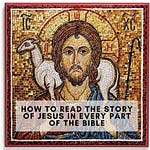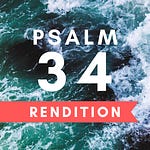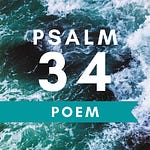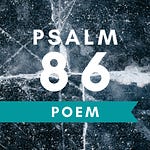Rendition
Out of the depths, I cry to you, Lord.
God, hear my voice.
I need you to attend
To my pleas for mercy.
If you kept our crooked loves always before you,
Who could endure it?
But with you is forgiveness
So that we can know the fear
That brings peace and consolation.
I wait for the Lord with my whole life
And in his word, I hope.
My soul waits for the Lord
More than watchmen wait for the morning,
More than watchmen wait for the morning.
O Israel, hope in the Lord,
For with him there is unearned love and kindness
And a vast redemption.
He will lead you back
Until your love is healed and whole.
Notes on the Rendition
Note #1: Repetition in Hebrew Poetry
This psalm is full of repetitions, as is all of Hebrew poetry and prose.
Repetition is one of the basic building blocks of biblical literature and Hebrew poetry. If you want to deepen your understanding of the Bible and take it on its own terms, you have to learn what is going on in the repetitions. To read the bible without seeing them is like reading a rhyming poem but not noticing that the words at the end of the lines have the same sound. You miss a lot of what brings meaning and beauty into the writing.
One reason they used repetition as a literary device was that they lacked punctuation. If you wanted to emphasize something, you couldn’t add an exclamation point. But you could repeat it. (“More than watchmen wait for the morning, more than watchmen wait for the morning.”)
Another reason is that repetition as a literary device has a profound range (much more than an exclamation point!). With that literary motif in place, you can do a lot with it. You can build the repetitions into a pattern, nesting other repetitions inside them. This is called a chiasm and they are all over the bible, both in poetic and narrative sections. Biblical writers use chiasms to highlight the writer’s main idea, make comparisons, and connect the main idea to other subtopics.
You can put the same idea twice in a slightly different way, underscoring your meaning:
“The cords of death entangled me; the torrents of destruction overwhelmed me. The cords of the grave coiled around me; the snares of death confronted me.” Psalm 18:4-5
You can also take the first line and invert it, making the second line say the opposite:
“Enter through the narrow gate. For wide is the gate and broad is the road that leads to destruction, and many enter through it. But small is the gate and narrow the road that leads to life, and only a few find it.” (Matthew 7:14)
Or you can make the second line fill in extra detail, intensifying or zooming in on what the first line said:
“But he was pierced for our transgressions, he was crushed for our iniquities; the punishment that brought us peace was on him, and by his wounds we are healed.” Isaiah 53:5
In this verse, the prophet uses repetition to show that not only does undeserved punishment fall on the suffering servant, but the fact of his wounding actually heals us. The second part of the repetition amplifies the first.
Jesus and Repetition
This helps make sense of why the bible is so allusive, why it is always referring to itself. When the New Testament quotes the Old Testament, or the Old Testament quotes itself, it is continuing the Hebrew poetic tradition of repetition.
This is especially true when the gospel writers tell the story of Jesus.
You can’t open a page in any of the four gospels without seeing four or five repetitions of Old Testament events, characters, or themes.
As a child, Jesus escapes to Egypt and returns, just like Israel. In the sermon on the mount, Jesus gives the law on a mountain, just like Moses. Jesus is tempted in the wilderness after his baptism, just like Israel. Jesus’ favorite title for himself is the Son of Man, a reference to the divine figure of Daniel 7 who sits down next to the Ancient of Days on the throne. Just as Israel ate the manna in the desert, so Jesus offers a better bread of life. (John 6) Just as Israel drank water from the rock, so Jesus offers a better living water. (John 2 and 7) Just as Jonah was three days in the belly of the whale, so Jesus was three days in the tomb. (Matthew 12)
And on and on.
The gospel writers take every chance to build the house of meaning for Jesus’ life, death, and resurrection using bricks from the Old Testament, just as their literary tradition taught them to do.
Psalms: 1, 2, 3, 4, 5, 6, 7, 8, 9, 10, 11, 12, 13, 14, 15, 16, 18, 19, 20, 21, 22, 23, 24, 25, 26, 27, 28, 29, 31, 32, 34, 35, 38, 39, 40, 42, 43, 46, 50, 51, 53, 54, 62, 63, 65, 66, 73, 74, 75, 84, 86, 88, 90, 91, 100, 107, 110, 114, 117, 118, 119, 120, 121, 122, 123, 124, 125, 126, 127, 128, 129, 130, 131, 132, 133, 134, 137, 139, 140, 142, 147, 148.
Request the Darkling Psalter in Print
If you would like to move this project one step closer to publication, sign up on this form to request the Darkling Psalter in print.













Share this post